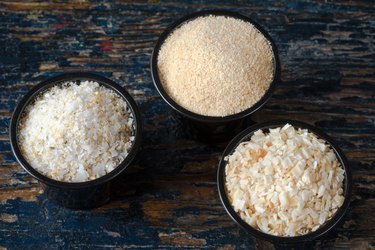
Onion powder, which is made from dried, pulverized onions, is most often used in dips, rubs or seasoning blends. It cannot function as a straight raw onion substitute because it lacks many of the characteristics that make onions appealing to use in cooking, such as high water content and texture.
Onion to Onion Powder
Video of the Day
A good rule of thumb when using onion powder is to treat it similarly to garlic powder. Both garlic and onion powders are used to season dishes such as hamburgers, meatballs or dry marinades for meat, fish or poultry, often in conjunction with other dried herbs or spices. Onion powder, while not a direct onion substitute, still retains that essence of onion, albeit in a more concentrated form.
Video of the Day
Onion powder is made from onions that have been dried — by air-drying, dehydrating or freeze-drying — and crushed into flakes or powder. When you buy a jar of onion powder you won't know exactly what type of onion the powder originally came from nor will you know what parts of the onion ended up in the mix. You could buy a jar of onion powder that was made from the skin and stem of a red onion when you might have preferred the root of a yellow onion.
A whole onion, on the other hand, is a known quantity. You can choose which variety you prefer — red, white or yellow — and can chop it as finely or coarsely as you wish. You can put the skins straight into the compost bin or reserve them to use when making vegetable stock (strain out the papery skins after you've made the stock).
Read more: Onions and Indigestion
Onion Substitute Falls Short
There are other differences when attempting to substitute an onion to onion powder. Nutritionally, a raw onion comes out ahead. One large, raw onion, the USDA reports, contains 60 calories. It also contains 134 grams of water, almost 2 grams of protein, 2.5 grams of dietary fiber, 6 grams of sugar, and minerals including potassium, iron and calcium, among others.
In contrast, a 1-teaspoon serving of onion powder, according to the USDA, contains 10 calories and 1 gram of sugar. The USDA does not list any other nutritional benefits, and by its nature onion powder is devoid of water.
A review published in the March 2015 issue of the journal Cancer Prevention Research examines the positive effects plants in the allium genus — of which onions are a member, along with garlic, shallots, leeks and chives — play in cancer prevention.
The review highlights evidence that alliums have potential anticancer properties although its authors caution that more study is needed to determine these claims scientifically. The review mentions both raw and dried allium vegetables as containing these possible health benefits.
The National Center for Home Food Preservation gives drying and dehydrating times for vegetables. The Center recommends first blanching onion slices in a cheesecloth bag in boiling water for four minutes. Then the slices should be spread out in an even layer on a baking sheet and dried in the oven for 6-10 hours on your oven's lowest setting (140 to 150 degrees Fahrenheit). Once the onions have reached the "very brittle" stage they are ready to be removed. The dried onions may be crushed into a fine powder.
Read more: Do Onions Have a High Carb Content?